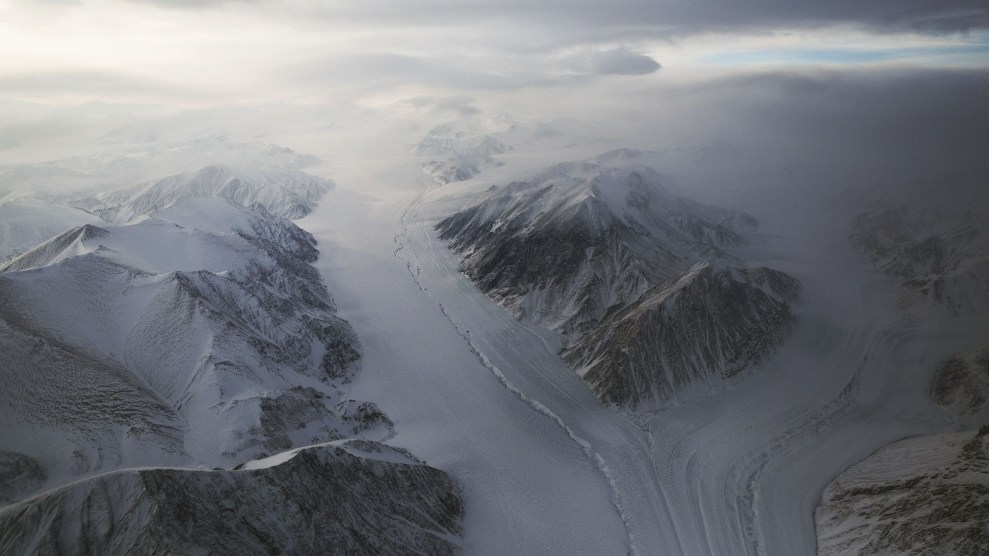
Beneath the ice on Canada’s Ellesmere Island is hidden life waiting to reawaken as the glacier melts and reveals ancient moss.Mario Tama/Getty
Welcome to Recharge, a weekly newsletter full of stories that will energize your inner hellraiser. See more editions and sign up here.
Buried under ice for centuries, plants in the warming Arctic have hit air and are awakening, to the surprise of scientists. The resilience of these species suggests newly known plants may emerge as other species die off, sped up by the climate crisis.
“You wouldn’t assume that anything buried for hundreds of years would be viable,” Catherine La Farge, an evolutionary biologist at the University of Alberta, told the Washington Post.
La Farge brought back Arctic moss from Canada’s Ellesmere Island to her Edmonton lab, where almost a third of the samples reawakened. “The material had always been considered dead. But by seeing green tissue, I thought, ‘Well, that’s pretty unusual,'” she said. The plants left La Farge and colleagues “pretty blown away.”
Others have made similar discoveries from Earth’s polar regions amid fears of reborn bacteria or pathogens. Mosses frozen for thousands of years in Antarctic permafrost have been reborn. A University of Tennessee microbiologist has coaxed back to life a Siberian nematode estimated at more than 40,000 years old.
“If they survived 41,000 years,” researcher Gaetan Borgonie told the Post, “I have no idea what the upper limit is.”
Here are more Recharge stories to get you through the week:
- One with nature. The dying forest ranger had one last wish. Firefighters were happy to oblige. They took Edward Reis, still in his gurney, on a three-hour springtime journey through the woods and the shore of Washington state’s Meadowdale Beach Park, on Puget Sound. They paused to let him hear the running of a brook, smell the fragrance of cedar, and view a verdant vista. “We would stop every so often and he would just sit and listen,” says his hospice nurse, Leigh Gardner, who accompanied him. “He was just smiling the whole time.” Reis, 62, who was diagnosed with multiple sclerosis in 2008, died this year on April 13, and an account of his excursion on hospice volunteers’ Facebook page became popular in June. “I miss his presence,” Gardner says. “He was a gentle, gentle soul.” Thanks to Recharge reader Karen Weintraub for the story tip. (ABC News)
- The youngest constituents. Who stands up for the next generations, for kids who haven’t been born yet? In Wales, there’s a Cabinet minister for that. Sophie Howe’s first-of-a-kind job, called the Future Generations Commissioner, is to improve the lives of those to come. Under a 2015 act, all Welsh public bodies must ensure their decisions don’t hurt tomorrow’s citizens. Howe’s post has drawn attention from the Netherlands, Finland, and South Korea, and she’s made an impact by promoting bike-sharing and other future-thinking programs. “I think there is a recognition dawning that the way we have been doing things across the world is no longer fit for purpose—it is damaging the planet and people,” she says. “I’m proud of what Wales has done.” (Positive News)
- Cookies for all. That’s the philosophy of 13-year-old Michael Platte, who has channeled his passion for baking and social justice into a business. The Bowie, Maryland, teen, who learned to bake from YouTube videos, donates one cookie, cupcake, or slice of cake to homeless people for every one he sells on Facebook or his website. Twice a month, he donates food around Washington, DC, and he has helped raise money for the charity No Kid Hungry. His selection includes shortbread cookies and a monthly cupcake inspired by freedom fighters such as Nelson Mandela, Harriet Tubman, and Maya Angelou. “It’s all about helping people,” Michael says, “not just having a purpose for yourself.” Thanks to Alisa Hermann-Wu and Lynn Johnston for the story tip. (Washington Post)
I’ll leave you with this image of a Calico sea bass at Channel Islands National Park in California, via the Interior Department’s Twitter account. Have a great week ahead!
Don’t be surprised if fish don’t like you. They’re fin-icky.
Calico sea bass 🐟 at Channel Islands National Park @CHISNPS #California #FindYourPark pic.twitter.com/zlUdHZ6Bt0
— US Department of the Interior (@Interior) July 5, 2019

















